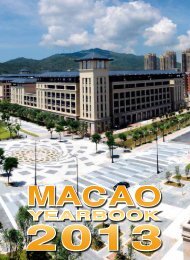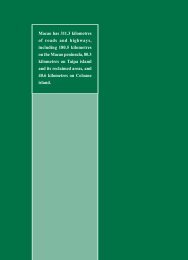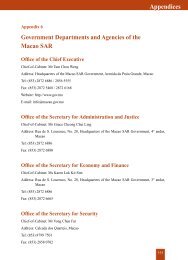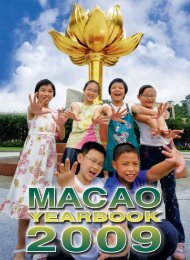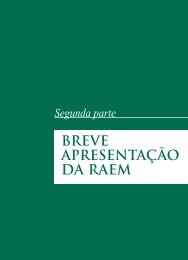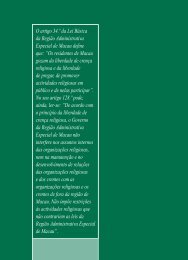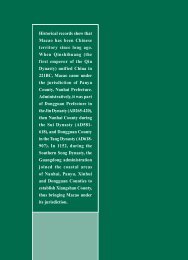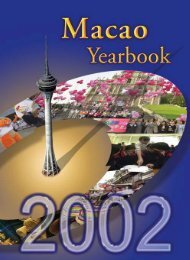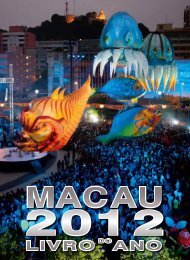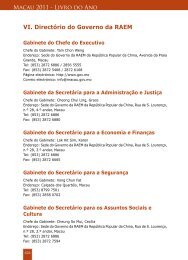Culture and Sport - Macao Yearbook
Culture and Sport - Macao Yearbook
Culture and Sport - Macao Yearbook
Create successful ePaper yourself
Turn your PDF publications into a flip-book with our unique Google optimized e-Paper software.
Health <strong>and</strong> Social Welfare<br />
homes for various reasons. In 2008, 1,080 senior citizens were housed in homes for the elderly.<br />
<strong>Macao</strong> also has one public <strong>and</strong> six non-profit-making day centres for the elderly, <strong>and</strong> three<br />
non-profit-making multi-service centres, all of which are subsidised by the Social Welfare Bureau.<br />
These provide day care, nursing <strong>and</strong> rehabilitation for elderly people in failing health. In addition,<br />
one public <strong>and</strong> 22 non-profit-making social centres for the elderly organise social, recreational <strong>and</strong><br />
educational activities with subventions from the Social Welfare Bureau.<br />
In 2008, the 10 day care centres for the elderly provided services to 2,844 elderly people, while<br />
the 23 recreational centres provided services to 5,036 people.<br />
There are four Home Help <strong>and</strong> Community Support Teams in <strong>Macao</strong>, which are attached to three<br />
day centres <strong>and</strong> a day care centre for the elderly. The teams provide homecare <strong>and</strong> rehabilitation<br />
services to the elderly in need, as well as better support for physically frail senior citizens living in<br />
the community. Their services are divided into two categories: basic services <strong>and</strong> support services.<br />
Basic services include homecare services (such as meal deliveries, home cleaning, bathing, personal<br />
care, laundry, escorting the elderly <strong>and</strong> accompanying them when they receive medical services,<br />
shopping, <strong>and</strong> other assistance outside their homes) <strong>and</strong> psychological <strong>and</strong> social support services<br />
(individual counselling, home visits, support via the phone, <strong>and</strong> communal mutual-aid network<br />
activities). Support services include nursing <strong>and</strong> rehabilitation services. In 2008, the teams provided<br />
such services to 523 senior citizens, 338 of whom were living alone.<br />
The Caring Service Network for the Aged is another programme in which volunteers regularly<br />
visit <strong>and</strong> show their concern for elderly single people, giving them the warm feeling of being cared<br />
for by society. In 2008, the network provided services to 976 senior citizens who lived alone.<br />
Senior Citizen’s Card<br />
Citizens holding <strong>Macao</strong> Resident Identity Cards aged 65 or above are eligible to apply for the Senior<br />
Citizen’s Card. Senior Citizen’s Card holders are entitled to the welfare <strong>and</strong> benefits offered by<br />
the public organisations <strong>and</strong> enterprises that have signed cooperation agreements with the Social<br />
Welfare Bureau. By the end of 2008, the Social Welfare Bureau had issued a cumulative total of<br />
30,121 Senior Citizen’s Cards.<br />
Rehabilitation Services<br />
<strong>Macao</strong> has five non-profit-making rehabilitation homes, all of which are subsidised by the Social<br />
Welfare Bureau. Four of these provide residential care, vocational training <strong>and</strong> social <strong>and</strong> recreational<br />
services for mentally disabled adults, the chronically mentally ill, <strong>and</strong> children under 15 who are<br />
either mentally or physically disabled. The other is a halfway house for patients who are recovering<br />
from psychiatric illness. Eight non-profit-making day care centres subsidised by the Government<br />
provide services such as training for independent living, group learning, physiotherapy, social<br />
activities <strong>and</strong> personal assistance to the deaf, the mentally disabled, people recovering from mental<br />
illness <strong>and</strong> the visually impaired. During 2008, the five homes provided residential services to 320<br />
people, while the eight day-care centres provided rehabilitation services to 907 people.<br />
At present, six subsidised sheltered workshops, vocational training centres <strong>and</strong> supported<br />
employment centres assist the disabled. They help to make the disabled aware of their own potential<br />
<strong>and</strong> employment capabilities, <strong>and</strong> encourage them to become “self-confident, self-reliant <strong>and</strong> self-<br />
419



